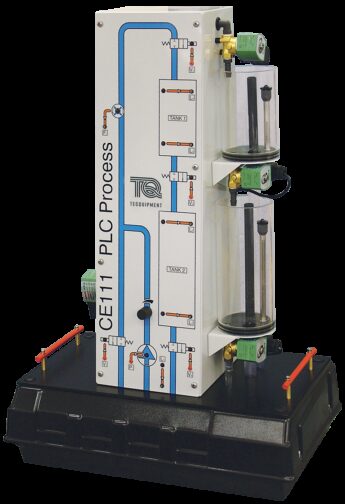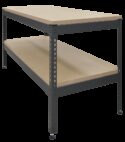Experiment
CE111
PLC PROCESS
Provides a physical system on which students can gain experience in the programming of programmable logic controllers (PLCs). The process is a model of a two-tank system typical of a chemical process in which liquids are measured before being mixed. The task for the student is to control liquid level and flow. For use with the PLC Trainer (CE123).
If you have any questions or you'd like to discuss a product, please call us.
+44 1159 722 611PLC PROCESS
TecQuipment’s PLC Process gives students and engineers practical experience of the principles and application of programmable logic controllers (PLCs). The object is to connect and program an external, programmable logic controller to monitor and control the level and flow rate of water in a two-tank system.
The apparatus has two transparent tanks, mounted one above the other. A variable-speed pump transfers water from the reservoir (in the base of the unit) into the upper tank. The water can drain down to the lower tank and then back into the reservoir. Solenoid valves may be individually opened or closed to control and redirect the movement of the water. The pump control is on or off, but a manual control allows the user to set the speed. A float switch in the reservoir monitors the level of water. Each tank includes two level sensors which measure maximum and minimum water levels. An in-line flow sensor provides a pulsed output. Its frequency is proportional to the flow rate and the number of pulses proportional to volume.
Indicators next to each input and output socket show the on/off status of the pump, the valves, the maximum and minimum level in each tank, and the flow rate.
An overflow in each tank prevents accidental overfilling.
Learning outcomes
When used with the CE123:
- Basic programming of a PLC
- Basic level control
- Tank filling sequence
- Simulated batch processing (sequencing)
- Ladder logic programming
- Editing and adding comments in a PLC program - The open structure of the CE111 and CE123 allows the user to create additional experiments to suit their needs.



